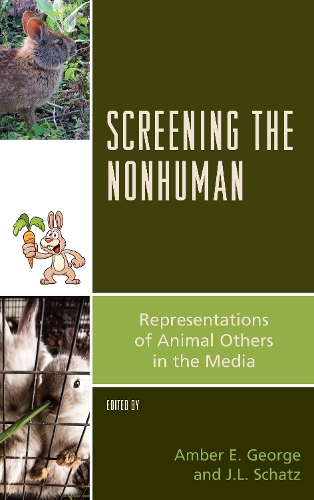
Screening the Nonhuman: Representations of Animal Others in the Media
(Hardback)
Available Formats
Publishing Details
Screening the Nonhuman: Representations of Animal Others in the Media
By (Author) Amber E. George
Edited by J.L. Schatz
Contributions by Joseph Anderton
Contributions by Michael Atkinson
Contributions by Fernando Pagnoni Berns
Contributions by Christina Victoria Cedillo
Contributions by Amber E. George
Contributions by Stella Hockenhull
Contributions by Anja Hing
Contributions by am Husemann
Bloomsbury Publishing PLC
Lexington Books
27th April 2016
United States
Classifications
Professional and Scholarly
Non Fiction
Communication studies
Animals and society / Animal rights - issues and debates
Wildlife: general interest
179.3
Physical Properties
Hardback
238
Width 160mm, Height 235mm, Spine 23mm
499g
Description
Screening the Nonhuman draws connections between how animals represented on screen translate into reality. In doing so, the book demonstrates that consuming media is not a neutral act but rather a political one. The images humans consume have real world consequences for how animals are treated as actors, as pets, and in nature. The contributors propose that altering the representations of animals can change the way humans relate to non/humans. Our hope is for humans to generate more ethical relationships with non/humans, ultimately mediating reality both in terms of fiction and non-fiction. To achieve this end, film, television, advertisements, and social media are analyzed through an intersectional lens. But the book doesnt stop here. Each author creates counter-representational strategies that promise to unweave the assumptions that have led to the mistreatment of humans and non/humans alike.
Reviews
Our fellow animals have had rough treatment on filmlike many of our fellow humans. But they cannot organize and protest like we can. The book you have before you gives us tools and evidence to make the case on their behalf. Freedom from harm is a basic animal right, and that applies to issues of representation as well as physical treatment. Their cause must be our cause. -- Toby Miller, author of Television Studies: The Basics
Finally, analyses of animal representations in popular culture from an explicitly Critical Animal Studies point of view. I enthusiastically recommend Screening the Nonhuman: Representations of Animal Others to those who want to enhance visual literacy while opening their minds to the revolutionary perspective of total liberation. -- Ian Purdy, Executive Director, Institute for Critical Animal Studies
A wonderfully insightful, provocative, and much needed book that combines critical theory, media analysis, and cultural studies with the ethics and urgency of animal liberation politics. This crossover work builds bridges between activism, academia, and the general public, and will surely inspire discussion and debate about the role of nonhuman animals in both film and society. -- Jason Del Gandio, author of "Rhetoric for Radicals: A Handbook for 21st Century Activists"
Author Bio
Amber E. George is program coordinator for the Intergroup Dialogue Project at Cornell University. J.L. Schatz is instructor at Binghamton University.
